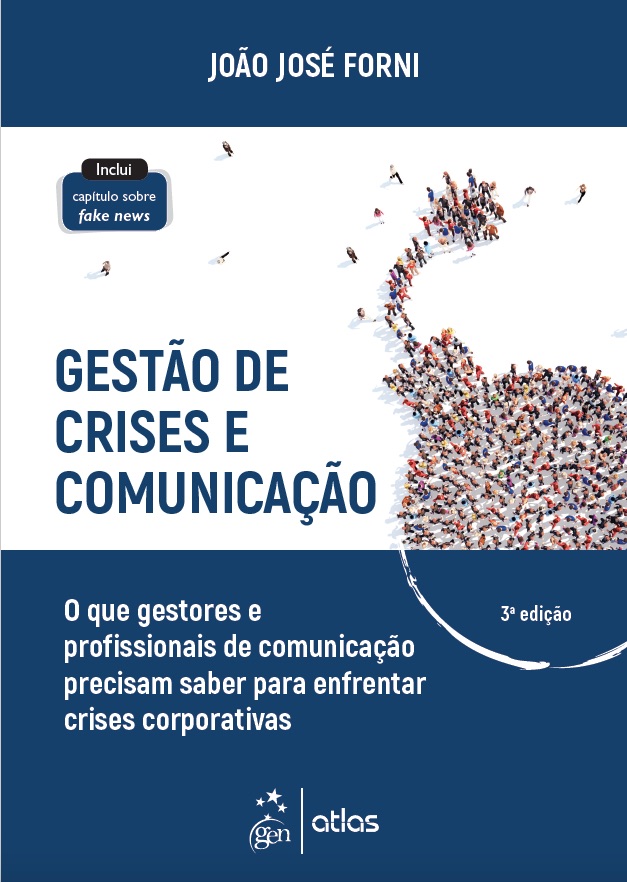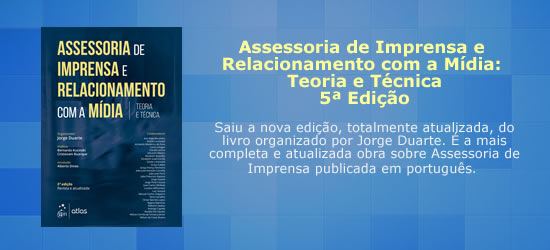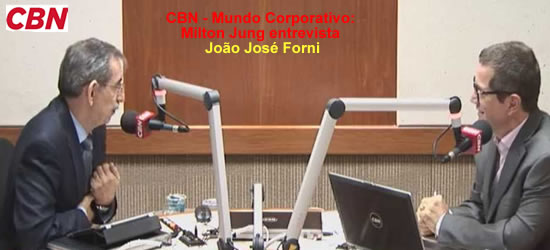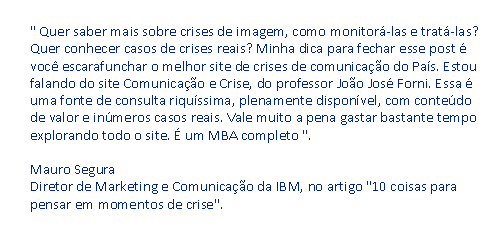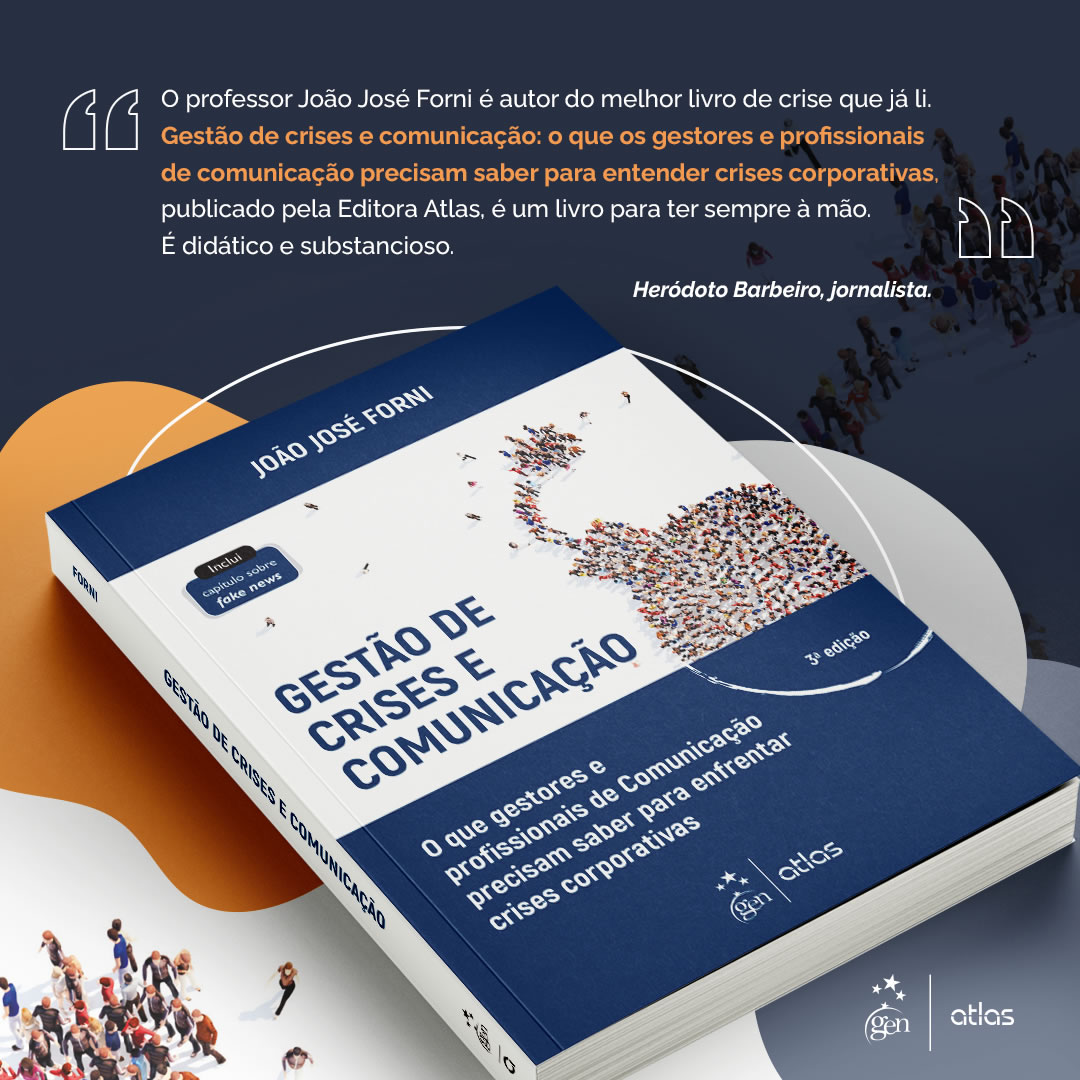
Quando o país naturaliza a morte, a crise já aconteceu
 Armando Medeiros de Faria*
Armando Medeiros de Faria*
O Brasil convive diariamente com números que deveriam nos chocar. Mortes no trânsito, acidentes de trabalho, enchentes, deslizamentos, rompimentos de barragens, assassinatos. São dados que se acumulam em relatórios oficiais, manchetes de jornal e estatísticas públicas — e que, paradoxalmente, deixam de produzir espanto.
Leia mais... “The reputation of an organization exists largely in what people believe of it”. The statement is from Jonathan Boddy, Director of Positive Impact and teacher of training programmes in the Chartered Institute of Public Relations - CIPR , in London, UK, that has answered some interesting questions about Crisis Management to the publisher of this website, João José Forni, in May, 2011. The version in Portuguese is also published in this website.
“The reputation of an organization exists largely in what people believe of it”. The statement is from Jonathan Boddy, Director of Positive Impact and teacher of training programmes in the Chartered Institute of Public Relations - CIPR , in London, UK, that has answered some interesting questions about Crisis Management to the publisher of this website, João José Forni, in May, 2011. The version in Portuguese is also published in this website.
C&C - Which are the most important actions to implement in case of a major crisis that threatens the reputation of an organization?
The key quality that makes an incident a crisis is the impact the incident has upon people. Alongside meaningful action to deal with the incident (operational response) an organization must be seen to directly address the people impacts. The reputation of an organization exists largely in what people believe of it. By addressing the needs of those affected by a crisis an organization has a good chance of maintaining its reputation.
Communication is very important in the early stages of a crisis and every effort must be made to demonstrate that an organization is responding and responding quickly to make things right. Delays in operational response or communications cost organizations their reputation.
C&C - What are the principal mistakes that an organization and public administrations are putting in place in case of a crisis?
There are quite a number of mistakes that are made and the biggest mistake is thinking that the crisis will never hit. Recent research in Europe has shown that even today the majority of organizations do not have crisis response plans in place. As a result of this error organizations do not plan properly for responding to crisis. Without a strong plan, training and testing people and processes , an organization is unlikely to be able to respond effectively.
Reasons for this attitude are things such as arrogance (“we are too big / too powerful / too important to be worried”), too busy, cannot afford it, and assuming that it is someone else’s responsibility rather than everybody’s responsibility.
As a communications professional another big mistake I see is that organizations forget the importance of communication alongside operational response at the time of a major incident. With resources and energy focused upon operational response and dealing with the incident it is easy to ignore or reduce the priority of how important it is to tell people about what is happening. Communication is an essential part of incident response.
C&C - How would you describe the studies and experiences of crisis management in United Kingdom? And which countries do you think have a good approach in Crisis Management?
The study of Crisis Management in the United Kingdom like the subject itself has many approaches, but little central study. Students will study it as a module of journalism or PR courses, industry will consider it from an operational impact perspective or a health and safety, risk management or legislative perspective. There is the Emergency Planning College that looks at the whole area of incident response however this has a very public sector focus. Efforts have been made recently to make the college more up to date and relevant.
C&C - Who must manage the crisis in a company? Who should be the leader? The person in charge of the process of Crisis Management?
A very good question and one that is not easy to answer. The answer will differ from organization to organization and of course depending upon the personalities of the CEO and the senior management team. As a general rule I think it is necessary to find a balance between the culture and the personalities of the organization drawing upon the strengths of both.
The CEO is the person in charge of the organization and therefore has an important part to play. However there is always a great deal to do at the time of an incident and to expect the CEO to lead and manage everything is unrealistic. I think the role of the CEO is to have an overview of the management of response, to contribute to strategic level decisions and to be publicly visible at key times during the incident and the organizations response. Airlines I work with will send the CEO to the scene of the incident and the management of the crisis will be done by other senior management.
An organization should have people within it who have specialist knowledge of aspects incident response and if the organization has planned properly and has a structure in place to deal with crisis then those people will come together under the leadership of a senior director. This might be the deputy CEO or another director who has more detailed knowledge of response procedures. This person leads the team and reports into the CEO.
C&C - What’s the role of the Communications and PR, in a major crisis in an organization?
The role of the professional communicators is vital. They will balance the need to communicate (driven by the organisation and reputational issues) with the demands for communication (driven by both internal and external stakeholders) at the time of a major incident.
The communications team will make the crisis control team aware of what is being said about the incident and the organization and the impact of this. They will follow the operational response of the organization and create key communication content around specific aspects of the incident. These messages can then be targeted at specific stakeholders. They will ensure that sufficient communication is coming from the organization at key times. They will also ensure that the right people within an organization are being seen at important moments during the incident.
Beyond the incident the communications team also have an important job in maintaining a dialogue with key stakeholders. Through this they can evidence that action has been taken to make sure the incident cannot happen again and that any learning from the incident has been put in place.
C&C - Do you agree the most parts of a crisis is not sudden? Are most parts of a crisis often smouldering? How much do you think it represents (in percentage)?
Yes, I think there is much truth in that. There will always be those crises that are totally unexpected and have a great dramatic impact, but for most businesses the review shows that with many crises there were opportunities to prevent them happening at all.
In business, where profit is a key driver, there is always a temptation to underplay risk in order to give better shareholder return. Often a lack of investment in training, crisis planning, health and safety is seen in the report following an incident. Outsourcing responsibility for operations is effectively putting the management of your reputation in another organization’s hands.
We had a good example of this a few years ago in the UK when we had a very dry summer. Water supplies in a number of areas almost ran out and the “crisis” was the inability of water companies to supply customers. What came through very clearly was that the people responsible for the supply had assumed that water would always be there and they had failed to plan and invest for long periods without rainfall. The longer the drought went on the more the failure to plan and invest showed.
With the smouldering crisis there are always opportunities to prevent them happening – if the organization is aware and brave enough to make the decision when it is needed!
C&C - Despite scandals and strong fights with media, some people such as President Berlusconi or former President Lula, in Brazil, still maintain good reputation’s scores in public opinion, and win elections. How would you explain those? Are some people more resistant to crisis?
There is no ready or easy answer to this as the question can only be explored on a case by case basis and will depend very much on national characteristics. For example President Mitterand of France was found to have had a mistress for many years. In the UK if our Prime Minister had done this there would have been a public outcry and calls for him to resign. In France most people said, “What’s the fuss? It is what men do”.
C&C - In those cases, what are the role of media in crisis? Do media have the strong role they think they have to manage public opinion?
Another interesting question! The media has a number of roles but does not necessarily have a responsibility. Let me explain that! In the United Kingdom we have both state broadcasters funded by government, the BBC, and independent commercial broadcasters and independent commercial print media. At the time of a major incident where there is a threat to life or a community the BBC will be used for public service broadcasting by emergency services and the authorities. The BBC will broadcast advice about the things that people should or should not do. Commercial media may also provide a platform for this information, so in that respect the media have both a role and a responsibility.
Beyond this responsibility the role the media fulfils is largely dictated by their own priorities. Commercial media need to make profit and therefore by driving up sales, listener and viewer figures or website hits they will increase profitability. The media is not the custodian of an organization’s nor an individual’s public reputation and they have no responsibility in that regard.
The media should report incidents in a factually accurate way, and with balance, reflecting the impact upon the various parties involved. The media may well ensure that the reality of an organization’s preparedness and the effectiveness of its response is made public however what must not be overlooked is that there is a pressure from within the media to play up the drama of a situation. A sensational story will increase sales revenue and audience figures. Whilst it is not a role of the media they will also highlight areas of blame and appoint these to individuals or organizations where they feel appropriate. The line between fact and opinion in the media can often become blurred!
Are the media influential in shaping public opinion? Yes they are. That is why communications professionals and their organizations must take a positive and action led approach to dealing with the media at the time of a crisis.
C&C - What would you say to a student in PR that intend to study and concentrate researches in Crisis Management?
Crisis management is a fascinating area. It draws together many threads of business operations, communications, marketing and PR as well as psychology and perception. The study of how people at all levels within an organization and the organizations themselves respond to pressure created by crisis is fascinating. Whilst there may be common themes around the nature of incidents and response no two situations are ever identical and can be explored and studied from many different angles. The more research that is done into the field the better!
C&C - What are the sectors in the World that concentrate the most crisis?
There are a range of industries that tend to be more aware of the potential for crisis than others. This is dictated by the nature of their work and the legislative framework that exists around them. So for instance such industries that have high risk levels such as nuclear power, oil and petro-chemicals and airlines will be more aware and have to demonstrate preparedness to satisfy public scrutiny. I would say that there is a second tier of industries that have a lower risk level in terms of scale of potential incident and these include construction and other non-airline travel such as trains, ships heavy haulage. These industries are not as heavily regulated for risk and whilst incidents involving companies in these fields may not be as catastrophic they are more numerous.
The last decade has seen a greater awareness of financial crisis. This has been everything from rogue dealers on the stock exchange, companies trading illegally, banks and other financial institutions operating outside of the regulatory framework. The impact of these incidents may not be as immediately visible as such things as explosions or building collapse but nevertheless they have become quite commonplace and the financial services industry has now taken more interest in preparing to deal with major incidents.
The one sector I haven’t mentioned is government and public authority. In the United Kingdom in recent years we have had Avian Flu, Swine Flu, Foot & Mouth disease, flooding, fuel tanker driver strikes, an increase in civil unrest around government policy to name a few. Government and local authority still maintain a high level of readiness for emergency response and contingency planning.
C&C - What would you recommend to people, professionals or politicians, when media or opponents intend serious accusation against them? Especially, when the accusation is true?
Well, the simple answer is - tell the truth, tell it quickly and tell it completely. I think it gives the worst possible impression if a story is revealed bit by bit. It looks as though the person at the centre of the story is trying to hide the truth and that they are not being open or honest.
If you are found to have acted wrongly then it is by far the best strategy to accept blame, apologise and say what you are doing to correct the error you have made or how you intend to behave in the future. If you are convincing then the story will go away more quickly and generally be less damaging.
We had a situation in the UK last year where many Members of Parliament were revealed to have claimed expenses incorrectly. Often large sums of money were involved and items that were clearly not allowable under the scheme were claimed. What annoyed the public was how so many of these people (who we are expected to trust and who tell us what to do and how to behave)refused to accept that what they had done was wrong and tried to justify their actions. The story dragged on and on because so few recognised how their actions were being perceived.
C&C - What are for you the companies in the world that appeared to have a good process of Crisis Management and that, can serve as models to other organizations?
Virgin Trains have dealt with a number of incidents very well in the UK. This has been largely based around a fast, people centred response headed very visibly by their leader the charismatic Richard Branson.
MacDonald’s Restaurants must be one of the best. When you look at the number of premises, staff and customers that interact with the company everyday and that as a restaurant chain they are serving food, the fact they have so few incidents has to be applauded. They have been at the centre of the debate around several very emotive issues such as obesity and farming techniques and have come through those without a major impact on their business. That suggests to me that their communications and crisis response processes must be of the very best.
By the same measurement, big company and high risk, Shell keeps out of the news as far as incidents are concerned, especially when the wider industry has taken much criticism in recent times. They also dealt with the debate about decommissioning of oil platforms very well despite being directly targeted by the direct action group Greenpeace.
Interview with Jonathan Boddy, Director of Positive Impact, to journalist João José Forni, editor of www.comunicacaoecrise.com, in May, 2011.
Jonathan Boddy BSc (Hons) FCIPR - Director of Positive Impact Communications & Training Limited, which he founded in 2002. He have been involved in developing and then delivering training programmes based around media and other forms of communication for over 15 years. Jonathan Boddy have worked alongside organisations large and small across all sectors and have delivered training in Europe and the United States of America. He is one of a handful of Approved Trainers from the Chartered Institute of Public Relations-CIPR and currently deliver a number of their media communication based workshops. Jonathan is UMIST – Management sciences degree


